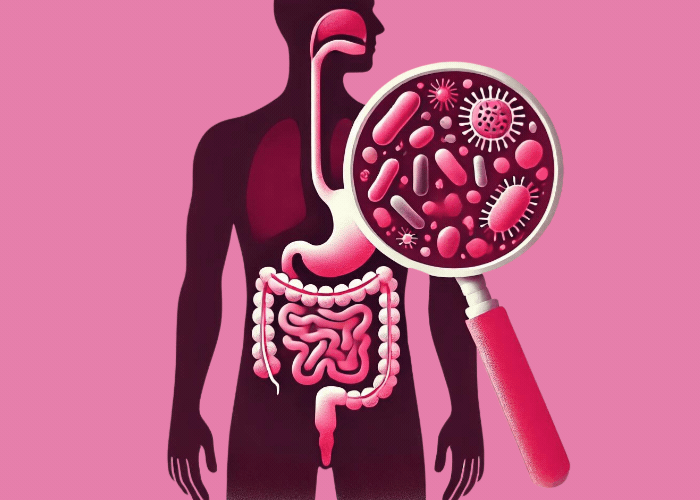Stress prepares our body for situations that require an increased alertness and exceptional performances. Our entire body is in a state of alert. If we are often or continuously under stress, it is not only an unpleasant feeling but can also have a negative effect on our bodies. What repercussions does chronic stress have on our health and what role do our intestines play in this?
Over 100.000 years ago, wild animals put our ancestors on high alert and triggered stress reactions in their bodies in order to ensure their survival – in other words, fight or flight. These processes were supposed to provide energy for our bodies so that we could either flee or confront dangers. Pretty useful. And even though what causes stress nowadays has changed drastically, the reactions in our bodies are still the same: body temperature and blood pressure rise, sweating increases and the muscles tense. Our attention focusses on the stress situation, and other bodily functions that consume a lot of energy are suppressed, because, from an evolutionary perspective, they are not necessary and even interfere in acute, dangerous situations. This includes the digestion!
Generally, stress is understood to be an unexpected strain, caused by irritations and burdens. These affect our body and/or our psyche and can either have an external or internal origin. The consequences that these strains have on our body differ between individuals. That means that stress doesn’t equal stress and is perceived differently by everyone. There are many different stress factors: continuous conflicts, deadline pressure, too little time, noise, financial problems, too little sleep, but also social isolation, perfectionism, being unchallenged and boredom can cause stress reactions in our body and can compromise our health over time. Stress is only perceived as unpleasant and burdensome when it occurs frequently or persists over a long period of time and additionally, isn’t processed adequately. In other words, when there is no physical or mental compensation. This constant negative stress, also known as distress, can make us sick because our body is constantly under pressure and can’t recover.
A stressed individual equals a stressed gut
Our bodies react to stressful situations by releasing hormones and messenger substances, e.g. Cortisol and Adrenaline, that induce a general inner tension. This can result in uncomfortable muscle tautness as well as other physical disturbances such as breathlessness, nausea, hair-loss and concentration disorders. Furthermore, the immune system is weakened and the risk of high blood pressure, strokes and heart-attacks increase. Chronic stress has especially devastating effects on our digestive system: The blood vessels in our digestive organs constrict which leads to a weaker blood flow to our stomach and intestinal mucosa, our digestion goes on strike and ultimately results in a widespread inflammation.

Everyone knows the feeling: you are approaching a deadline or are nervous and already your stomach is hard at work. This is because our intestines, or more specifically our gut bacteria, are very sensitive towards stress and nervousness. Stress causes helpful bacteria in our intestines to die off. Many different biochemical reactions also dismantle the connections between the individual cells in the intestinal mucosa, so-called „Tight Junctions“. As a result, germs, toxins and bacteria can pass unhindered through the intestinal barrier into the bloodstream – this is known as the „Leaky-Gut-Syndrome“. These weak points in the intestinal mucosa result in a faulty absorption of foods, followed by a lack of nutrients. Consequently, symptoms such as chronic fatigue, bloating and stomach ache appear. Additionally, the intestinal muscles can’t function properly and digestion comes to a halt.
And yet our intestinal health is crucial for our stress resistance – the more „healthy“ our gut flora, the better we are protected against stress. Gut bacteria directly affect the connection between the brain and gut (via the so-called Gut-Brain-Axis) and determine our body’s reaction to stress. Specially selected strains of bacteria can reduce inflammation and help our intestines arm itself against stress. Such probiotics contain lactobacilli and bifidobacteria, the permanent residents of a healthy and well-balanced gut. When our body is constantly under stress, the balance between wholesome and „bad“ bacteria is lost. New bacteria teams help to compensate the stress-related lack of „good“ gut inhabitants. They improve the barrier function of the intestinal mucosa, support the immune system, of which 80% is in intestinal tissue, and reduce the release of histamine.
Anti-stress tips for your gut and soul
Time off: reading, visiting museums, dancing, being creative – try to regularly find time for yourself and activities that you enjoy.
Diet: Be aware of what and how you eat. Try to replace your „stress-chocolate“ with, for example, nuts and instead of eating ready-made meals that are full of conservatives, try freshly cooked meals (even if it’s dishes from a restaurant or meals from an organic delivery service). Be mindful to enjoy your food, chew properly and avoid devouring it – this will also do your digestion good.
Social contacts: Surround yourself with people that you like and make you laugh. Good conversations in a relaxed surrounding will fill up your energy reserves.
Physical contact: Touch and massages are calming and relaxing. Even petting an animal works wonders for our nervous system.
Exercise: Regular endurance sports such as jogging, walking, swimming or cycling helps build off stress. Find out which sport you enjoy the most! Exercise additionally helps transport food through the digestive system and can, therefore, help with constipation, bloating and reflux.
Take a breather: Try to take a few minutes off for yourself, even during work. A bit of stretching or a cup of tea can help relax. Try to take deep breaths in and out while making sure your stomach moves forward too („abdominal breathing“)
Probiotics: Scientifically tested probiotics from the pharmacy not only support a stressed intestine but also improve our quality of sleep and the production of our „happy-hormone“ serotonin.
Warm water: A warm bath gives us the feeling of security and has a vaso-dilating affect.




























